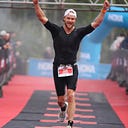Why you should track macros for a while
When most people hear “track macros” — they think of dieting. I was no different. But tracking macros is just as much about tracking that you get enough protein and calories if you’re trying to get bigger. I’m not a big advocate of tracking macros (at least in a “dieting” way), but it’s a great way to learn about what you’re actually eating and what’s good and bad for you.
I was around 28 years when I started learning about macros and actually started looking at the labels of the things I consumed, and I wished I started earlier. Tracking macros should be something you learn in school. Again, not in a “dieting” way, just to learn what you’re putting in your body. When I joined the army I lost almost 20 kgs, but gained it all back pretty quickly. If I would have had a clue about what I was putting in my body, that probably wouldn’t have happened.
Later, I started thinking about macros after going to the gym consistently for a couple of years, without seeing the results I wanted. I decided to learn about macros, and started tracking. This is where I should write something about losing a lot of weight and getting really fit. That would be a lie.
But what it did was open my eyes. I started tracking the macros for the meals I normally was eating, and through that, I noticed that I consumed too much fat and carbohydrates and not enough protein. So I started adjusting.
I only tracked for a couple of weeks, not even all the meals — but that gave me an understanding of the macros for the meals I normally consumed. After just doing it for a short while, it’s possible to estimate the macros just by looking at the meal.
So what we’re looking for is the healthy-tracking, to learn the approx. macros for different foods. And getting an overall understanding of what’s in the food we consume. That way, we can make sure you eat enough of what we “need”. A couple of examples:
- If we know you’re going out for dinner in the evening, we probably want to eat fewer carbs and more protein earlier in the day — as the meals we will have in the evening usually are higher in carbs and lower in protein.
- We realize that eating an egg/avocado breakfast, salmon/avocado lunch and high-fat meat dinner on the same day isn’t the best idea as that will be a lot of fat consumed in one day(for people with “normal” diets, not LCHF etc.).
And just by tracking for a while, you get used to looking at the labels. I promise, you will feel ashamed of what you’ve been consuming — and will automatically make adjustments. You will notice that those “healthy smoothies” actually aren’t that healthy.
